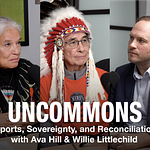Phil Demers joins me outside the gates of Marineland for this episode- a return to a conversation we began seven years ago at the Fox Theatre.
Back then, we were fighting to pass Bill S-203 to end whale captivity in Canada. The law passed in 2019.
Now, the fight is to save the remaining 30 beluga whales and 500 other animals who remain trapped inside as the park has ceased to exist. At one point, recently, Marineland even threatened to euthanize the whales if governments didn’t provide emergency financial support.
Phil “The Walrus Whisperer” Demers was a trainer at Marineland turned whistleblower. He spent over a decade fighting Marineland in court after leaving his job there in 2012. After 13 years of legal battles and public advocacy, Marineland is finally on its last legs. But the fight to save the remaining animals isn’t over.
We discussed what happens next, short-term and long-term solutions, and why governments should lead on this instead of playing only a reactive role.
Chapters:
0:00 Standing Outside Marineland
6:21 Why China Might Actually Be Better
10:04 The Sanctuary Myth & Rescue Reality
14:08 30 Dead Whales
18:13 500 Forgotten Animals
19:30 13 Years of Legal Hell
24:37 Conclusion: The Divorce Analogy
Read further:
The Walrus and the Whistleblower - Documentary (CBC Gem) https://www.cbc.ca/documentarychannel/docs/the-walrus-and-the-whistleblower
7 years ago with Phil:
Transcript:
[00:00:00] Nate Erskine-Smith: All right, well, welcome to Uncommons. It’s an interesting episode because I’m joined by Phil Demers, who actually joined me at the Fox Theater many years ago, four years ago before we started the podcast actually. And it was just a, a local town hall event. We showed Blackfish. Right. And you were there to talk about your experience as a whistleblower at this horrible place behind us.
[00:00:19] Uh, it is interesting how far we’ve come, but also that the issue is so acute still. Uh, at the time we were talking about a bill that had to be passed. To end this kind of production and make sure we were protecting institutions in captivity. And you were adamant we had to get this bill passed. Hmm. Well we got the bill passed.
[00:00:37] Yeah. And yet we’ve got marineland, uh, beside us now, and it was grandfathered through in a way. And now we’ve got 30 beluga whales. We’ve got 500 other animals that are, that are in here. Mm-hmm. And all of which, all, all of whom need to be saved in, in, in one way or another. And, uh, it didn’t [00:01:00] have to come to this, really did it.
[00:01:02] Phil Demers: Well, we’ve, what, what has glossed over in much of, of your story is we’ve got a unwilling marine land in all of that. Yes. To evolve in any way, shape or form to be a, financially viable, uh, you know, for the security of their own future. Uh, but b, to adhere to any of the laws that we essentially passed, both provincially and, uh, and federally, although we did ban the breeding of the whales. Yep. Had we not banned the breeding of the whales. So, so currently there’s 30 belugas remaining. There’s four dolphins. Uh, we got two sea lions and a, and a host of, uh, land animals there. Had we not banned the breeding of belugas in 2019?
[00:01:41] Nate Erskine-Smith: Yep.
[00:01:42] Phil Demers: And albeit, the pregnant belugas of 2019 were grandfathered in.
[00:01:47] So there were some whale birth births there. On average, Marineland had five to seven belugas born per year. A couple would die. But there’s, you know, it’s conceivable to say that whereas [00:02:00] we have 30 right now in there, we would have had an excess of 50. Right. They would’ve kept probably 60.
[00:02:05] Nate Erskine-Smith: Yes, of course they would’ve kept the business model broke down with that law.
[00:02:08] But if they would’ve kept going otherwise, I mean, they’re, they were the bad actors. It’s the, it just wants to keep it active
[00:02:12] Phil Demers: At this point. It’s the only, it’s the only part of the law that they’ve, ad they’ve adhered to outside of importing, of course, which, which, uh, we ban. So it’s, it’s beyond their control, but.
[00:02:21] Um, you know, the breeding, they, they stopped, but had they not, we’d be talking about 50 to 60 whales in those tanks. It, it was, uh, you know, that’s something to really hang our hat on. That was a huge, uh, and super progressive, uh, lawsuit. But it does interestingly, take us to this place now where marine land is, you know, we essentially bankrupt.
[00:02:39] I, but we should stress owns a lot of land sitting on 700 acres of prime land meant to fuel or feed the, uh, the whole family trust. That’s, those are the heirs to it. You know, the operation is essentially sucking the money out of that. And so they’re looking for the, be it most lucrative or least expensive [00:03:00] way to get outta this thing.
[00:03:01] The sale to China was to be a profitable one. Uh, should be stressed that here in North America, none of the facilities wanna do business with marine land, right? A few years ago, five belugas were sent to Mystic Aquarium, three of which died within weeks and months. Uh, all having to do with, uh, preexisting conditions from Marineland.
[00:03:20] Nate Erskine-Smith: So, so pause, pause for a moment. ‘cause I think for those who are listening, they may not know you’ve got 30 belugas here. And there was, uh, a deal that Marine Land wanted a broker, at least with a facility in China. Ocean Kingdom time, long Ocean Kingdom. The decision of the federal minister was to say no animal welfare first.
[00:03:41] Uh, the primary purpose here is entertainment and, and we’re not convinced that they’re gonna be putting animal welfare first. Akin to the concern here, right? And, and why we don’t want this to contain to exist. But then the knock on question why is so acute right now is okay, but then what? Because marine land comes out as proper monsters. They say, well, if we don’t get emergency funding, we’re gonna, we’re gonna euthanize these whales,
[00:04:05] Phil Demers: which is a familiar theme with Marineland. In all of my years of dealing with them, it was always do this or else. Uh, again, I I, this morning alone, I watched a, a YouTube video. It was pretty.
[00:04:14] Pretty thorough history of marine land and in it is always the familiar threat of, well, if you don’t do this, I’m gonna, and it includes ship the park to the, to the US that includes, you know, a whole host of things. But that’s all, that’s marine land’s bluster when it, they don’t get their way right. But that said, the, the spirit of the law was to give, uh, to give final say to the minister so that they can ultimately consider the interests of the animals in it, which is a level of personhood, which is not.
[00:04:39] Which is atypical of most laws, especially of animals.
[00:04:40] Nate Erskine-Smith: Of, yeah. Yeah. An incredibly important step. Yeah.
[00:04:43] Phil Demers: Really, really, uh, progressive, you know, the spirit is to end captivity and, you know, and if you can stamp that out here, the, the idea is that it, it’s, uh, it’ll evolve to the rest of the world. And to be fair, uh, France adopted a very similar law recently passed, [00:05:00] uh, as well as, uh, new South Wales.
[00:05:02] The province in Australia adopted a law. It’s actually picking up around the world. So, so it’s, you know. I always stress when we, we look at, hey, we wanna end captivity, I always stress that’s a hundred year, that’s a hundred year fight. If all goes extremely well, you know, you’ve got burgeoning business in China, some in Russia, right?
[00:05:20] And we’re still ending sort of ours here, sort of choking that off here and that’s still expanding there. So, you know, we’ve, we’ve started something that’s gonna continue elsewhere, but you know, it’s gotta end here. It’s gotta end here first and ending.
[00:05:33] Nate Erskine-Smith: You can put a law on the books and, okay, so. Uh, on a going forward basis, you, you might avoid problems and, and avoid cruelty, but you still have 30 belugas here.
[00:05:44] And then the question becomes, well, what happens next? And, and I don’t wanna pretend that it’s just a marineland problem because you were just, uh, commenting on the fact that in Miami you got seaquarium that’s now shut down, that this is going to happen in other places too. Well of Mexico just banned it.
[00:05:59] Phil Demers: [00:06:00] And now all of their animals, now captive and legally captive can no longer perform in shows, can no longer do the swim with programs, et cetera, et cetera. So what happens is it becomes unviable to the owners. They lose their incentive, their incentive to have and use these animals. So what becomes well, unfortunately, in, in, in my estimation of what is available to us.
[00:06:20] Nate Erskine-Smith: Yeah.
[00:06:21] Phil Demers: You know, I’d always had hope that the much of these animals would go to the us, but it’s not gonna happen by way of a broker deal because again, none of ‘em wanna touch marine land for obvious reasons. Again, I, I mentioned the five whales that died at, uh, mystic.
[00:06:33] Nate Erskine-Smith: Yep.
[00:06:34] Phil Demers: They also know of the bad PR.
[00:06:36] Marine land’s been getting here for the decades. I mean, it’s been global news, you can’t ignore it. So SeaWorld also had to sue Marine Land a number of years ago to get an orca back. So SeaWorld doesn’t wanna touch marine land, so I don’t think. Anyone in the US wants to associate with buying animals off marine land or brokering any type of deal affiliations, et cetera, et cetera.
[00:06:54] But you know, I’d had this hope that this government, the provincial [00:07:00] Animal welfare society, especially with their policing powers and their ability to seize animals. You know, you have, you have essentially an opportunity to seize these animals and send them to these places, whereas those places might be receiving of them if they’re by way of a rescue versus of, of a broker deal.
[00:07:15] But again, this is me talking, theorizing, trying to figure this thing out.
[00:07:19] Nate Erskine-Smith: But let’s imagine that so, so the federal government. Has done its part in passing the law. I, I think the federal government could play a strong convening role here. And, and we’re starting to, I mean, in the wake of the minister turning down those permits, uh, to, uh, ocean Kingdom in China, I mean, uh, there is a role for the federal government to show some leadership here, but the actual law, the power that you’re talking about, the seizure power that exists, provincially, provincially, and you got Doug Ford over here talking about caring about dogs and okay.
[00:07:46] I, I like that. Okay. Yeah. Let’s, let’s have concern for, for all animals. Uh, but in this particular case, as soon as Marineland says, well, without emergency funding, we’ll euthanize them. They should be coming in here, seizing and using their authority. And, [00:08:00] and, and by the way, I mean even as part of, uh. Uh, I was reading, uh, as part of the settlement back in 2017 and driving the lawsuit.
[00:08:07] I mean, they agreed to monitoring. I mean, like, what are we even talking about here? Have animal welfare experts, animal science experts. Well, they’re in there. They’re in there. And why, and why can’t, and then why can’t Doug Ford sees these and say, now we can broker a deal with the animal welfare top of mind instead of marineland trying to extract top dollar.
[00:08:25] Phil Demers: So in the think tank, that’s become, since all of this and the Yeah. You know, sort of the, where does this go? I do have to say with limited options, China might be atop the very best options. And let me explain why if those animals were in a neutral place right now. Just let’s just, let’s just do this as like a, a sort of a thought, uh, uh, experiment if this animals were in a neutral space right now and yet to elect where they’re going.
[00:08:49] Yeah. Outside of the laws themselves, which is, you know, for the most part, it doesn’t exist in China. That I, that I know, I don’t wanna be quoted, but I don’t know what the animal, uh, oversight and, [00:09:00] and, and laws are like over here. But we know what they are here. Yeah. And we know that they exist here. But that said, they’re not really do serving so, so much.
[00:09:07] Uh, these days, if there was a choice between the facilities, it’d be hands down, you’d be sending them to, to China. It wouldn’t even be a question. There wouldn’t even be a question. These are brand new facilities that massive I had. A team member was there two weeks ago, a a, a former, uh, friend of mine that worked at marineland Works there.
[00:09:24] These are brand new massive, expansive facilities, the conditions of which are good and in fact maybe even be said to be great in the realm of captive facilities. I don’t want to be a defender of any facility. I don’t wanna say, Hey, that’s a good one, but what, on the scale of, you wouldn’t consider this for a moment, but because they’re in there, it becomes a little bit more complicated because it’s a question of, of removing them, but.
[00:09:48] Because of the limited space of where those animals have and being against the clock, they’re gonna have to go somewhere. And, uh, again, I stress the us I ideally, first and foremost, if it doesn’t work out [00:10:00] there, or if, you know, obviously they don’t have the space for 30, we know this already, some are gonna have to go to China
[00:10:04] Nate Erskine-Smith: So let, let’s walk, let’s, I, let’s take some time to walk, walk through those options. Because again, some people might say, well, why not return them to the wild? We’ve seen the consequences of that in, in, in some ways. You, uh, in, uh, there was a return to, uh, facility in, in, in Iceland at one point, I think in.
[00:10:24] So, well, that’s not, that’s not gonna work. And so there, there are just knock on challenges to, to that option.
[00:10:28] Phil Demers: There is no such thing as a perfect scenario. Also, that needs to be stressed because I think we’re, we’re, and we have been wasting a lot of time and thought on what would be perfect. Right? And it doesn’t exist.
[00:10:38] We have to scale that. Our expectations back to what is. And, and also stress that these animals are not very healthy. Now, I’m not gonna call them sick. Do we know? Do, is it Well on a, on a scale of the, they all, they’re all unwell by virtue of the conditions that have been here.
[00:10:58] Nate Erskine-Smith: But do, uh, is there that [00:11:00] openness with, uh, say.
[00:11:02] Uh, nonprofit or, or government experts and, and animal scientists who have access into properly not a chance.
[00:11:09] Phil Demers: And, and for that matter, anything that you would’ve access to look at would be changed,
[00:11:12] Nate Erskine-Smith: right?
[00:11:13] Phil Demers: So, so anyone that has a pen and, and putting it to paper has an interest in some people not knowing everything that’s going on.
[00:11:20] Nate Erskine-Smith: So Wildes out and then you’ve got, uh, wild is out and there have been proposals. For animal sanctuaries, there’s one in Nova Scotia that, that is, that is closest to realization. No. Uh, having spoke well, having spoken to the, the folks there, they said, well, the earliest is really next fall. And that’s an optimistic timeline.
[00:11:38] And, uh, and then you’re, they’re talking about a max of taking 10 of the whales, which today, in the environment that we exist, uh, doesn’t seem like the most plausible option when you want to protect these animals and, and put animal welfare in their animal interest first. Today. So, uh, the answer does, you know, first it’s just who’s the decision maker?
[00:11:59] And it can’t be marine land that is deciding what the deal on the table should be.
[00:12:03] Phil Demers: Well, clearly they’re not, they don’t make the decisions in the best, the best interest of the Yeah, exactly. Just to stress the point of the, of the whale sanctuary in Nova Scotia. I wish it more than anyone to be an operational place, but it’s not.
[00:12:13] I’ve gone, it can’t be, it’s not going to be. Its decades and hundreds of millions. And who’s foot in the bill? This is. A theory at best, and we got to move beyond theories or else what happens is people start hanging their hats out. People start talking, talking, talking. But the specific needs of those animals, and that’s outside of a perfect world, if we’re gonna have a sanctuary for animals, that has to be tried.
[00:12:36] In the best cases, not in one of duress and, and emergency, et cetera. It’s, this is an experiment for the most part, but those animals need to get a access. So we’re talking about a, uh, this monster sanctuary, but did they, in all of that, go through the what is required to actually care for these animals?
[00:12:53] You need a, a rising floor of a tank to be able to access sick animals so that you can give them, uh, medication, et cetera. You gotta be able to [00:13:00] access the animals, but an animal’s sick in the middle of your sanctuary. How are you gonna get them? And get them on a, on back to the shoreline, back into a tank where they can be monitored and then, you know, be given drugs and et cetera treated.
[00:13:12] And you’ve got the, the challenges that these animals already face is just outside of the scope of what an experiments at this point can offer. Right? These animals need facilities with people that know where to inject The animals know where to draw blood, know, you know, they got the book on the meds and they got access to those animals because that’s essentially what they need.
[00:13:32] When we’re talking about what the. What’s happening here? It’s essentially a rescue and it’s, it’s how it needs to be framed. It’s how I’ve always said it. And again, I I’m, I’m sounding like a broken record because I’ve been saying this for a decade, and if you read it, it’s, it, I don’t think I’ve done a single interview in the last decade where I said, if we don’t get those animals out, they’re gonna die.
[00:13:50] And, and, you know, it’s easy to say, well, of course they’re all going to die if they don’t move. But you know, if you watch. At the rate that I was saying it and the rate that the animal [00:14:00] started to die, we’re talking about a scale that’s grading up and speeding up and accelerating. So 30 animals have died there, essentially.
[00:14:08] I, I know it’s in the records as, as 2020 whales, but you know, if you add the three that died at Mystic as being marineland whales, right. If you add the, uh, while we know that in the, in 2019 there’s an affidavit that Marineland sworn of having 58 beluga whales. But we know that they would’ve pregnant ones.
[00:14:27] So five to seven more born there. Deduct those numbers. ‘cause they’re, they’re no longer in that inventory. Um, you’ve got 30 whales that have died essentially since about 2018. More than 50 since I quit, which will have been 60 or more if we hadn’t have passed the, the breeding bin. Nothing here is new.
[00:14:55] Marine land’s, bluster, et cetera, et cetera. You’re finally hearing their actual voice. You’re not seeing [00:15:00] the jingle on tv. You’re not seeing them talking about their, their animal welfare record and, and boasting it as the best in the world. You are seeing the, the people here have seen the marine land, the, the real marine land for the first time.
[00:15:09] Yeah.
[00:15:09] Nate Erskine-Smith: Big difference between everybody loves marine land and we’re gonna kill the whales if you don’t gonna sip on. Right. And this is a, this is a theme I’ve known for far too long because, you know, they don’t like me. But, uh, so just to close the, close this, uh, what’s on the table? It could be on the table.
[00:15:24] So. You’ve got, uh, sanctuaries talked about promising in the longer term, potentially
[00:15:30] Phil Demers: Well, if, and when that exists, the belugas hopefully are alive no matter where they are in the world to one day be received there.
[00:15:36] Nate Erskine-Smith: Right, right, right.
[00:15:38] Phil Demers: There’s so there if they’re alive, which we have to stress.
[00:15:39] Nate Erskine-Smith: And so, but in the immediate term, uh, you’re looking at, in an ideal world, when it’s not an ideal world, uh, you’ve got the premier acting, you got the provincial government that would seize. Control in order to make decisions in the best interest of the animals, you’ve got a situation where then you would survey what’s available across North America and [00:16:00] and elsewhere and say, we’re gonna proactively reach out and try to place these animals, putting animal welfare interests first.
[00:16:07] Phil Demers: And if I was negotiating those moves, I would say any re, any facility that receives these animals. Have to adhere to the spirit of the 2019 law. Right. Which is, and I think North America would, would be glad to adhere to that. They already generally do. I don’t think they’re breeding belugas. Uh, you know, most of these places have their own, despite it not being law, they’re sort of in-house no longer breeding.
[00:16:27] Definitely orcas that I know of, hopefully dolphins one day, but we’re, we’re not there yet. Uh, but that, yes, so with the caveat that, hey, if we can follow this, you know, it should be noted that. The spirit of of S two S 2 0 3, which is the law that passed, was that we’re, we’re gonna eradicate captivity in Canada.
[00:16:44] Sort of the idea was, you know, we’re gonna end this situations of captivity. And well, with the idea of that globally, this build had this, this effect. But that said, these animals who are already here, sadly, and with, with zero to minus zero option of ever being returned [00:17:00] to the wild, and I hate to be this voice.
[00:17:04] But if they go elsewhere, it may very well spare some live ones from being captured. And that is in the spirit of the law. So there is some salvation in this ending in Canada. The animals moving on to better places. Yep. And no more whales ever returning. And that practice being said and done, and we wash our hands of it.
[00:17:24] And that’s the biggest win that can be done. The noise of our bullhorns out here. Follow them to the next place. They’ll hear us out there. The fight continues where they go. That’s, that’s the reality. We got a hundred year problem ahead of us if everything goes well.
[00:17:43] Nate Erskine-Smith: And let’s talk about the other animals.
[00:17:45] I mean, you are known as the walrus whisperer. You didn’t start fighting. Just for the whales. I mean, you were fighting for the walrus smooth. She, and there are an estimated, what, 500 other [00:18:00] animals? It’s a lot of deer in there. Yeah. And, uh, and so is that also part of the picture here? I mean all obviously the public focus has overwhelmingly being on the whales, but, uh, what do we do with the other animals?
[00:18:13] Phil Demers: Well, that I know of, the Toronto Zoo expressed some interest. They were visiting the facility in early October. Those animals are likely destined for, uh, I mean, ideally, some sanctuaries that we know do exist. They, there are some, yeah. Um, the bison are already gone. No one seems to really know where there, there’s theories, but they’re gone.
[00:18:37] Uh, the bear, they that they’re gonna have a tough time because bears are, are solitary animals. They shouldn’t be confined to a tight space anyways. It’s already really, uh, antisocial and dangerous for them. It’s like a really unnatural environment. And so the coat is sort of stunted and no place is looking for a bunch of bears.
[00:18:53] So, you know, I’m, I won’t be surprised if a lot of them get euthanized very quietly, uh, and, you [00:19:00] know, the deer, 500 deer or so, what are you gonna do with that? So, I, I don’t know. Again, I, I, I leave this to, you know, I, I’m, you know, I’ve had my sort of, I, I got a decade plus of fighting against this place.
[00:19:14] That’s the extent of my knowledge of animal rights. And a lot of people come to me and say, Hey, this, this, and that. I’m just like, uh, talk to an organization that knows this stuff.
[00:19:23] Nate Erskine-Smith: Right. So they, I mean, the last time we spoke, uh, where we were, we had an audience in front of us.
[00:19:30] Yep. Uh, that’s, that, that you were still Yeah. Yeah. You were still deep in litigation where they were taking you on and trying to silence you. Mm-hmm. Uh, I mean, it’s interesting, you know, you’ve come to animal rights, but also, uh, you’ve. Really been, I think, uh, uh, you’ve, you’ve shown what it is to be a whistleblower in a, in a, in a publicized important way.
[00:19:53] And the, and the importance of whistle blowing protections despite the fact that they came after you with everything they got. And, uh, where [00:20:00] is all of that at now? I mean, you’ve, uh, uh, before we started recording, you’re talking about smooshy ended up where, so we
[00:20:07] Phil Demers: essentially, you know, so they sued me in 2000, early 2013 for plotting to steal smooshy the walrus.
[00:20:12] Yep. You terrible verse you and I could have done it, but I didn’t. And it had nothing to do with Marine le, but if anyone could have done it, but I wasn’t going to, you’d have to be crazy. And much as they tried to make me out to be crazy, uh, you know, I, there’s some percentage of crazy, but it’s not, not to the scope of what they had described in this lawsuit.
[00:20:31] So, you know, it was baseless. It, it did inspire antis, SLAPP legislation, uh, provincially, which was great. It didn’t help me, but it’s, you know, it, it’s there for the future. It’s important.
[00:20:40] Nate Erskine-Smith: Yeah.
[00:20:41] Phil Demers: And I also stress when you, when you say, you know, you did, you, you were a whistleblower and you know, we, we, we passed a, a host of different sort of whistleblower protection laws and everything.
[00:20:49] I, this wasn’t an animal rights issue. It, it, this was an animal rights issue when I left. It wasn’t animal rights. It was a, here’s what I’ve experienced and if something [00:21:00] doesn’t happen to this, this, this, these animals will, you know, their suffering will increase. Tell you, I know me suddenly being sued.
[00:21:07] Like these were, these were my friends, these animals and, and the employees. This is like, these were, you know, you’re gonna see your neighbor’s dog like that and you walk ‘em every day. You’re gonna have some concerns. Like, so this was that for me. It spills over into an animal rights realm, of course, because animal rights, people who had, you know, to their credit, been fighting this forever, suddenly, you know, I, I show up, but you know, to be fair, I’m not really an animal rights guy.
[00:21:31] She was your friend, smooshy. Yeah, of course. Right. That’s of course. But I’m just, when it comes, those you love mistreated when it comes to the history of, and what is. The box of animal rights activists, which I get very often. It’s like, no man, it’s just, it’s not, that’s not really what this was for me.
[00:21:49] What this was, was, let’s say, professional asshole versus semi-professional asshole. And it was a clash of all crazy proportions if you weren’t witness to it. I, I could only [00:22:00] imagine how much fun it was on the sidelines. I mean, I, I, I, I like to do it up for the people, put on a show, and we did. Uh, but that’s what this was, this was every corner.
[00:22:08] This was a fight. Tooth and nail in every aspect and element of every which way of my life outside of that, of the animals. It was a, it started as an animal thing and it’s taken on an entire other, uh, entire, entire other, uh, uh, level.
[00:22:24] Nate Erskine-Smith: But, but with that said and taken over your life, I mean, uh, well, the litigation and just the, I mean, all of that takes an incredible amount of toll and time
[00:22:33] Phil Demers: I would not have imagined when it happened that.
[00:22:36] That this was going to be like the most forever decision. I, I’ll be honest, and this is ambitious and in retrospect, super naive of me, but armed with the truth at the time, I thought in my mind, this is gonna take six months to resolve the, again, my objective was not, let’s shut marine land down six months.
[00:22:53] Well, what did I know about litigation, about anything? I just thought, well, listen, if the people know, well, not even the people. I thought if the, [00:23:00] if the authorities knew the, you know, if they knew, and here they were here, it was, they knew. And that was like the beginning of my journey. And here I am 13 years later and it all wholly and entirely reshaped into a, a pretty efficient marineland busting machine.
[00:23:19] Like it’s, it’s been a pleasure. But, uh, but yeah, there’s an element of almost, it’s a weird one and, but I, I almost chalk it up to what retired NHL players might. I feel like when they, when they’re so engaged in something that, that, that requires so much energy and, you know, like, and, and levels of execution and like, you know, you really gotta psych yourself up for some of the shit I’ve been through now I’m trying to take a breath from it all.
[00:23:48] Then we got this thing going on still. You’re like, ay, ay. So no, it turned into, i, I guess what will be a decade long, uh, life identifier. It’s become. [00:24:00] You know, I’m, I’m kind of married to this place now.
[00:24:02] Nate Erskine-Smith: Right, exactly. And, and, and you live through personal challenges and then coming after you legally and then all of that.
[00:24:11] But you, you, I mean, you, we stand outside this place today and it’s, you’re gonna out survive it. You know? This is on his last legs. And it’s, uh, in a, in large measure the law we passed in large measure the public outcry and large measure because you were able to shine a light on it and, and called attention is something that was wrong.
[00:24:32] Phil Demers: It kind of looks like a divorce and now we want the kids
[00:24:37] hard to, hard to find a home for the kids. That’s the problem. Well. But here we are. Uh, but again, exactly, I, I, I do stress. I think that all of this will be revisited by the feds because there is gonna have to be some extra consideration give to the immediate conditions. Yes. As just this, the extent of, of how awful all of this is.
[00:24:54] Should other things be considered first? Yes, I think so too. I don’t think marine land should stand on, uh. [00:25:00] Hey, do what we say or, or give us money and this and that
[00:25:03] Nate Erskine-Smith: No. They’ve, they’ve found their way to profit. It’s a, they should care for the animals.
[00:25:07] Phil Demers: It’s a, it’s a breath of fresh air to not to see nobody caving because, uh, Marineland has known that for too long.
[00:25:12] Yeah. Uh, but, you know, so there, there should be a, a very diligent work done as into what can be done for these animals. But, you know, given the fact that we are super limited, I think there’s gonna have to be some reconsideration. To the Chinese facilities. It just is. It would be great if they came with the caveat of don’t breed them and don’t do this.
[00:25:32] Maybe that could be negotiated. I don’t know.
[00:25:35] Nate Erskine-Smith: But I think, uh, and I think it’s useful to close here. I mean, in the end, in the same way that, uh, you’ve got individuals including yourself who have shown leadership. I mean, at this moment in time, we need governments not to react, not to say, well, it’s our job to review a permit, or it’s our job to review.
[00:25:51] If there’s a complaint or there’s an investigation to say, no, no, no. We are gonna proactively find a home for these animals. We’re gonna proactively pull the stakeholders together, [00:26:00] together, pull the organizations together across North America and elsewhere. Say it’s not a perfect world. So what exists here?
[00:26:06] What what is possible, and to, and to show some leadership and, and to not just react and to try to solve the problem in a proactive way and not leave it. To these guys who are not intending to solve the problem at all and are didn’t want the law passed in the first place.
[00:26:20] Phil Demers: They’ve proven themselves as being irresponsible caretakers.
[00:26:24] It’s time for other people to have a hand in what becomes, and uh, you know, they may not like it, but they’ve set the stage for exactly that. So now other people will have a say.
[00:26:33] Nate Erskine-Smith: Appreciate it
[00:26:34] Phil Demers: Anytime








